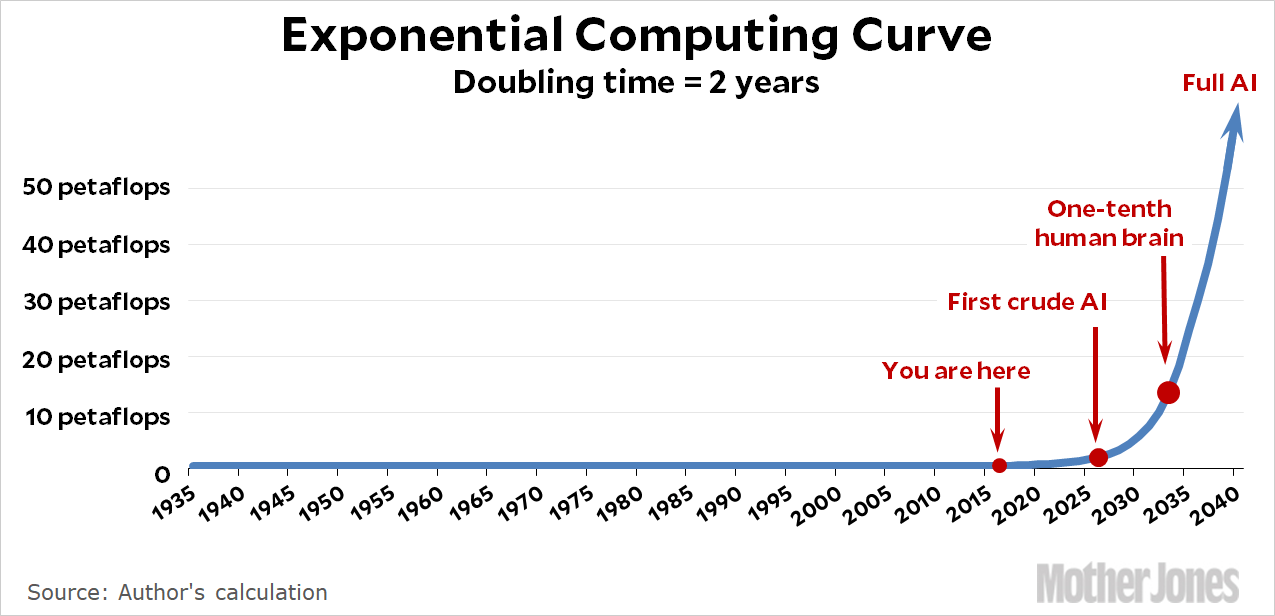Oh look: my piece about robots and mass unemployment is up. I wanted to make it crystal clear what it was about, so the headline is “You Will Lose Your Job to a Robot—and Sooner Than You Think.”
Needless to say, not everyone agrees. And I address some of the most common criticisms in the text of the article. But I feel like I should add one other thing: an awful lot of pushback about the revolution in artificial intelligence amounts to pointing out what AI can’t do right now. Driverless cars get confused! Siri misunderstands stuff all the time! Watson has been a bit of a bust for IBM in the medical diagnosis market! The human brain is really, really complicated!
This stuff is, frankly, not worth giving the time of day to. It’s like laughing at the Newcomen steam engine because it was really inefficient and broke down a lot. For three or four decades, the laughter seemed justified. Lots of people fiddled with steam engines, but they didn’t really get much better. It was just another bit of Cornwall Valley hype.
But then along came James Watt and suddenly steam engines got real. Add in better manufacturing and continued improvements and the Industrial Revolution was born. Back in 1712 nobody knew how that could happen, but it did. Someone figured it out.
The same is true for AI. The reason it doesn’t work very well right now is that it doesn’t yet exist. Nothing we have today counts as even crude AI, and the barriers to getting there are formidable. But the glimmerings are pretty obvious if you open your eyes, and just about everyone in the field agrees that improvements over the past decade have been far greater than in previous decades. In other words, thanks to improvements in hardware, software, algorithms, and custom silicon, the growth of digital intelligence is not just exponential, but finally at the point where we can begin to see that it’s exponential with our own eyes. That’s never happened before. Within ten years we’ll most likely see the first crude but real artificial intelligence, and people will begin to lose their jobs to it. That will accelerate for the following three or four decades until virtually no one has a job left.

This is different from the Industrial Revolution, where machines took away jobs but also created lots of new jobs. The AI Revolution will be nothing like that. Once the intelligence of AI gets near the class of human intelligence, then by definition, any new jobs it creates will also be done by AI. Welcome to the future of mass unemployment.
This is the point of my article. Part 1 of my robot trilogy, four years ago, was mostly about the rise of AI itself. Part 2 recapitulates some of that, but it’s primarily about what AI means for the future of the economy. The short answer is that by the end of the century it will probably be great: robots will do all the work and we humans will get all the benefits. But getting there will be rocky:
One thing is certain: The monumental task of dealing with the AI Revolution will be almost entirely up to the political left. After all, when the automation of human labor begins in earnest, the big winners are initially going to be corporations and the rich. Because of this, conservatives will be motivated to see every labor displacement as a one-off event, just as they currently view every drought, every wildfire, and every hurricane as a one-off event. They refuse to see that global warming is behind changing weather patterns because dealing with climate change requires environmental regulations that are bad for business and bad for the rich. Likewise, dealing with an AI Revolution will require new ways of distributing wealth. In the long run this will be good even for the rich, but in the short term it’s a pretty scary prospect for those with money—and one they’ll fight zealously. Until they have no choice left, conservatives are simply not going to admit this is happening, let alone think about how to address it. It’s not in their DNA.
Owners of wealth will have every incentive to see every increase in unemployment as a temporary thing. And they’ll be right some of the time. After all, the economy will continue to go up and down, just like always. At some point, however, labor force participation will start dropping steadily enough that it will be difficult to deny what’s happening. But even then there will be tremendous resistance to understanding what this means: that labor and wealth creation have become permanently unmoored. That means accepting an entirely new way of distributing wealth. Unfortunately, I can’t think of any era in human history where that’s gone peacefully.
Really, we have only two choices. The first is to accept that this is coming and start preparing for it, calmly and reasonably. I can’t bring myself to say that I think this is likely. The second choice is to fight it as long as possible until the vast (former) working class revolts—possibly with violence, possibly not. That will force the issue, but the results are dangerously unpredictable. If the zillionaire class is smart, they’ll start thinking hard about this and eventually conclude that their own enlightened self-interest suggests that they give up some of their wealth in return for enormous economic growth in a peaceful and stable society. I suggest several ways this could happen in my article, but I have to say that the main takeaway is that hardly anyone outside the tech community is really thinking very much about this. That needs to change.

















